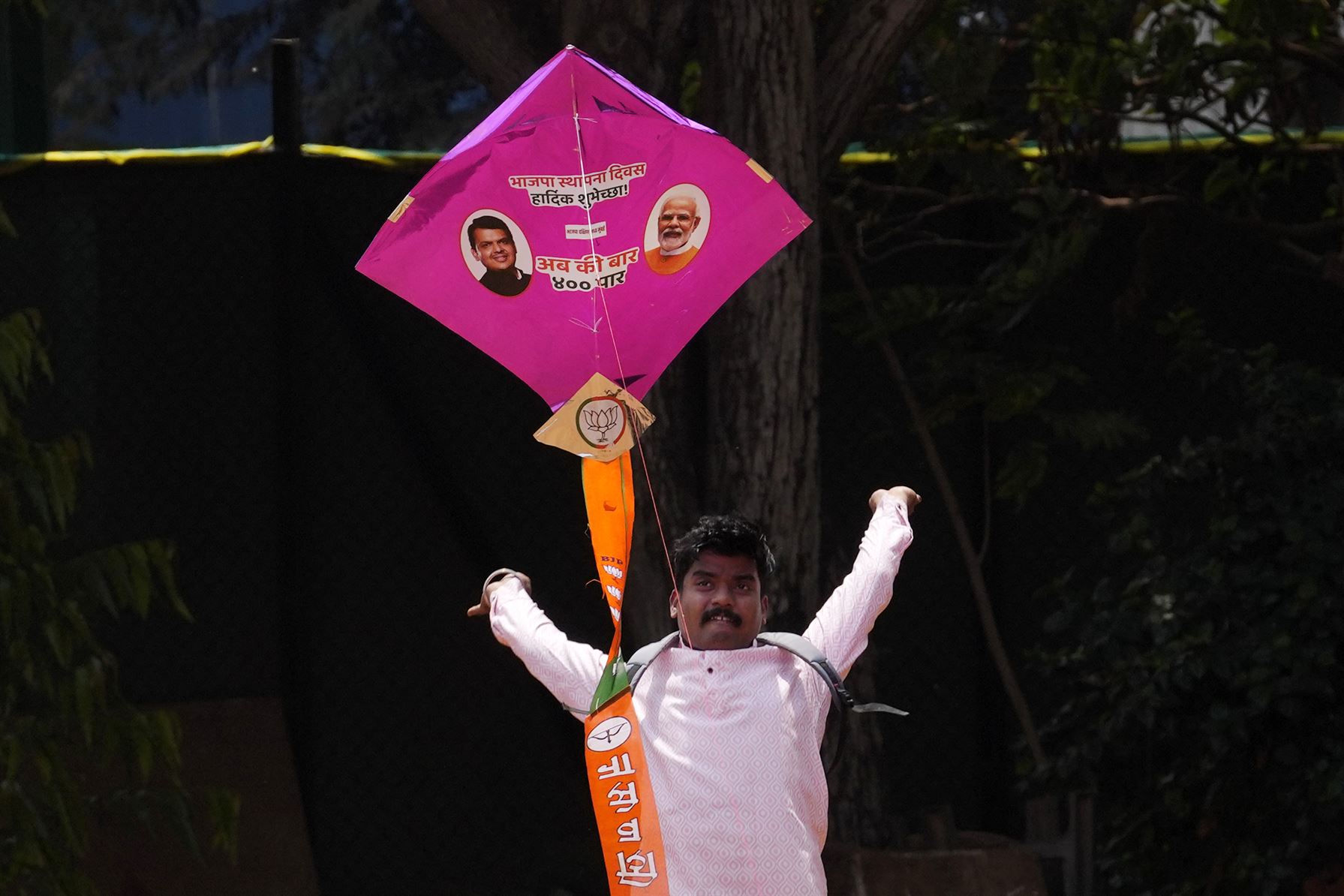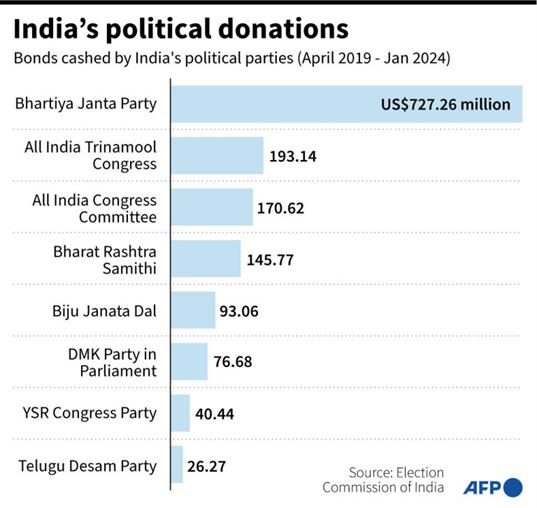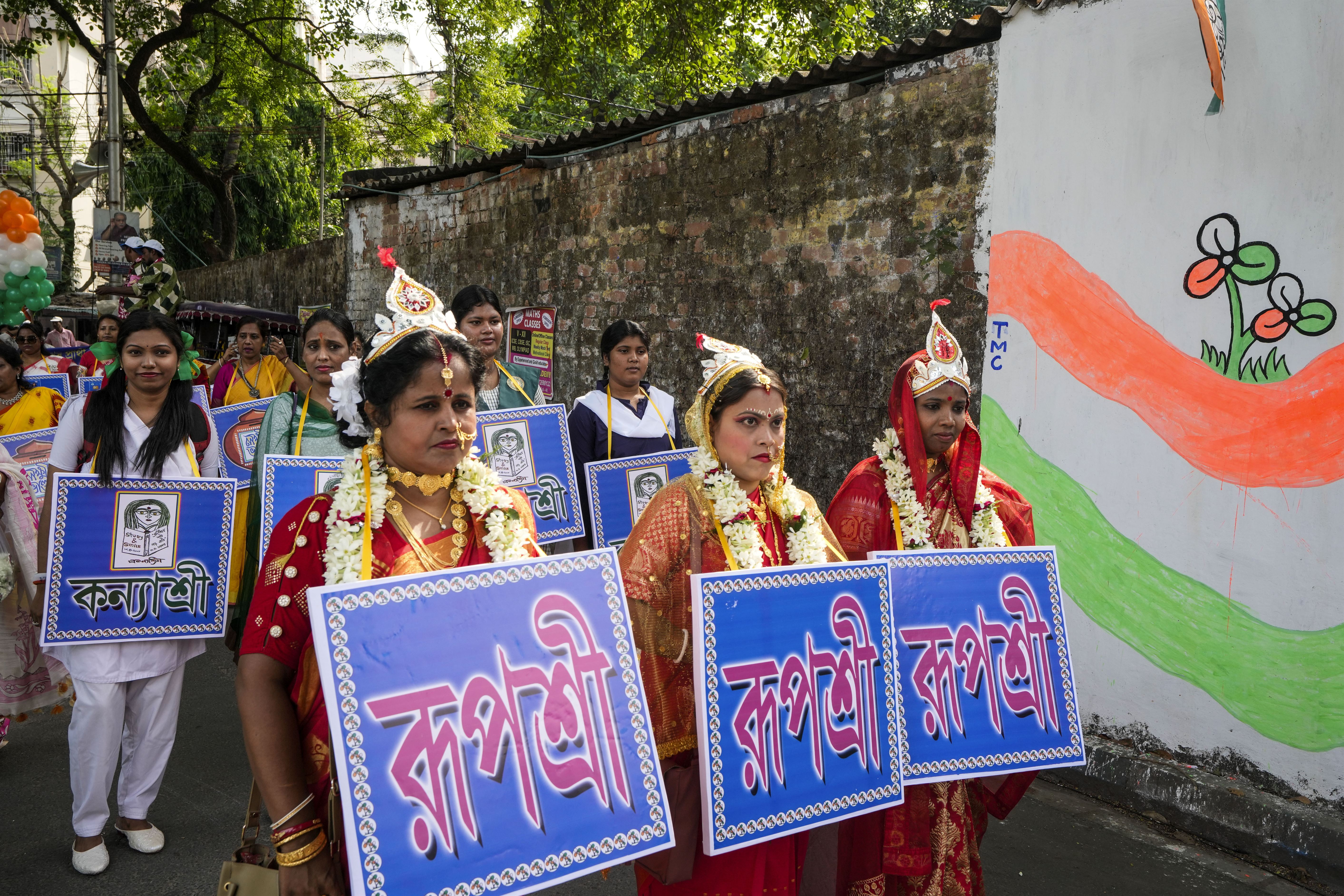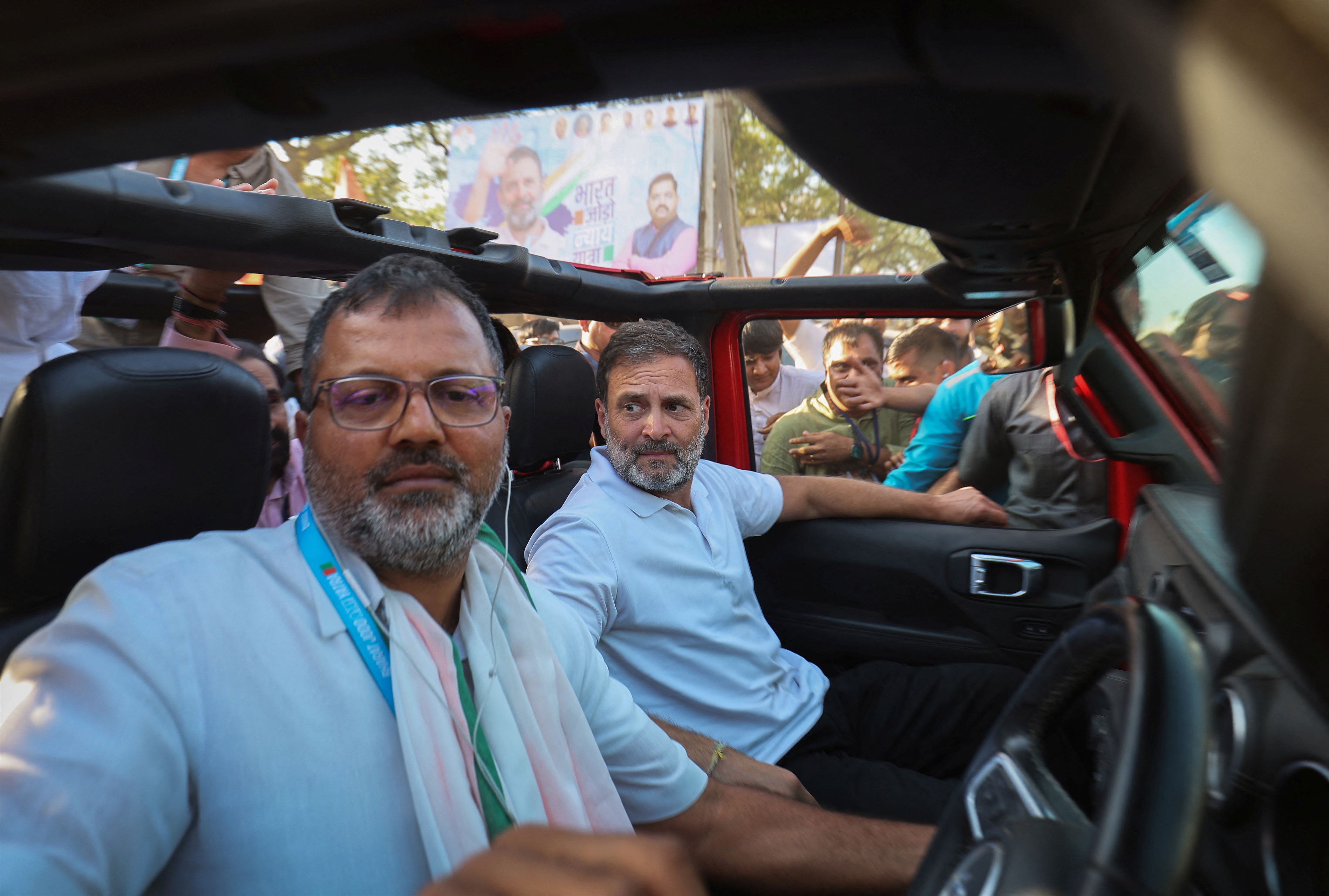
RAEBARELI / HALOL, India - The city of Raebareli in northern India has for most of the last 75 years been the political fiefdom of the Nehru-Gandhi dynasty that dominates the once-powerful Congress party and provided three of the nation's prime ministers. But, with India's general election just weeks away, the party's central offices there tell the story of its decline.
Clothes dried in the courtyard, while a washing machine beeped and a family living out of the office went about its morning chores. No other Congress workers were present.
"Some people here say the end of the Gandhi era is now imminent," said teacher K.C. Shukla, a Congress member who resides in the house where his relatives had set up a party office decades ago.
Raebareli is one of just 17 constituencies being contested by the Congress party in Uttar Pradesh, India's most populous state. Prime Minister Narendra Modi's Bharatiya Janata Party (BJP) is targeting a clean sweep of its 80 seats in the lower house of parliament.
Virtually all opinion polls suggest Modi's Hindu nationalist party will return to power for a rare third term - and dominate in Uttar Pradesh - when results from the seven-phase election are announced on June 4.
Neither party has yet named its candidate for Raebareli, though both BJP and Congress officials said an announcement would be made this week. The seat was represented by Congress's long-time president, Sonia Gandhi, from 2004 until she entered the upper house of parliament this year.
Reuters interviewed 21 lawmakers, party officials and analysts, including 13 members of Congress, for this story. Many of them described a party that faces another big loss in Uttar Pradesh, and risks losing its status as India's main opposition group as rival regional parties make gains elsewhere in the country.

They blamed what they described as lackluster management by Sonia and her son Rahul, Modi's leading national critic, and the family's inability to rally the country's fractured center and center-left opposition.
Over two dozen opposition parties, including Congress, formed the anti-BJP "INDIA" coalition last year but the bloc has been riven by bickering and defections by important members.
The BJP's critics, who say that Modi's government discriminates against religious minorities such as Muslims and has weaponized law enforcement agencies against political opponents, fear a third term would be corrosive to democracy in the world's most populous nation
Major regional parties such as West Bengal's Trinamool Congress (TMC) and the Bahujan Samaj Party (BSP) in Uttar Pradesh have declined to contest the election with Congress and are running candidates against both BJP and the Gandhis' party.
Rahul's office declined an interview request. When asked by Reuters at a campaign rally about his political future and opinion polls, he said: "My job is to spread political activism; results can never be predicted." He did not comment when asked about divisions among the opposition.
Congress president Mallikarjun Kharge told Reuters that the "alliance reflects the true spirit of democracy: we are together against Modi," though Congress was willing to fight alone if needed.
Asked about the risk of Congress losing its status as one of India's big two parties, Kharge said his focus was on defeating the BJP's Hindu nationalist ideology, and not Congress's strength relative to other parties.
The BJP's critics, who say that Modi's government discriminates against religious minorities such as Muslims and has weaponized law enforcement agencies against political opponents, fear a third term would be corrosive to democracy in the world's most populous nation.
The government has rejected allegations that it has hounded opposition leaders with federal investigations and Modi denies that there is religious discrimination in India.
Modi's aides have also downplayed concerns from left-of-center parties that he will amend the constitution to remove references to secularism, a move that BJP's critics say would fulfil his Hindu majoritarian agenda.
"BJP’s vision of single-party rule in the country is an approach opposed to India’s diversity and pluralism," said Congress federal lawmaker Shashi Tharoor.

Rise of regional parties
Jawaharlal Nehru - Rahul's great-grandfather - was India's first prime minister and his Congress party ruled India for 54 of the 76 years since independence. Rahul's grandfather, born Feroze Gandhy, changed his last name after being inspired by Mahatma Gandhi.
Many Indians had an emotional connection with the Gandhi family, said political analyst Rasheed Kidwai, the author of three books about Congress and the clan.
Such was their influence that for decades, "there were no factional leaders within the Congress," he said, adding that a longstanding combination of fear and respect for the family had recently dwindled.
Rahul continues to lead public rallies and his 52-year-old sister, Priyanka, is a top party strategist. But the family looks set to preside over a third straight loss in national elections and Priyanka most recently led Congress to a crushing defeat in Uttar Pradesh's 2022 state polls, harming the prestige of the Gandhi name, according to political analysts.
Congress has fallen behind BJP in the fundraising stakes - and lost access to some finances as a result of tax probes. Meanwhile, influential regional parties have raised billions of rupees in funds through opaque campaign finance mechanisms such as electoral trusts and bonds, according to a Reuters review of public records.
Dinesh Singh, a minister in the BJP-run Uttar Pradesh state government, told Reuters that his party's main challengers in the state - which many experts see as a bellwether for public opinion due to its size - were two regional parties, including BSP, who are contesting more than 40 seats.
The Gandhis "will be phased out completely," he predicted of the upcoming election.
Pankaj Tiwari, a senior Congress leader in Raebareli, said that Priyanka - who has never held elected office - would likely contest the Uttar Pradesh district and "will win with a record high margin."
Congress president Kharge said it would be a mistake to assume his party does not pose a challenge to BJP nationally. Congress is running on a platform that includes expanding affirmative action programs for marginalized castes and guaranteed jobs for young Indians.
There have also been nascent signs of unity among the opposition after the recent arrest of Delhi's chief minister, a top Modi critic.

Defections from loyalists
More than 8,000 politicians from Congress and other parties, including key youth leaders and prominent state leaders, have defected to BJP since Modi took power in 2014, according to data from the ruling party.
Reuters was unable to verify the figures independently, but three Congress leaders said BJP's numbers appeared to be generally accurate.
I am here to tell you how Modi government is working at the behest of country’s richest people: the Adanis and Ambanis.
Rahul Gandhi, Leader of India's main opposition Congress party
Some opposition leaders who were the subject of investigations by law enforcement agencies such as the powerful Enforcement Directorate - which has probed more than 100 opposition politicians since 2014 - have defected. Many of the inquiries were subsequently dropped or put on hold.
But six former Congress leaders who switched allegiances - none of whom have been accused of wrongdoing - told Reuters that they left the party because of mismanagement.
Chunnilal Sahu, a lawmaker from the mineral-rich Chhattisgarh state who defected to BJP in 2023, accused his former party's leaders of failing to take accountability for past electoral defeats at local level.
"Instead of introspection in case of defeat, they just ignored the reasons," he told Reuters. "They don't conduct proper surveys ... There is no change. There is a group of people who run the party like a private limited company."
BJP federal minister Jyotiraditya Scindia and his late father were Congress loyalists and key aides to the Gandhi family. But Scindia left Congress in 2020, saying the Gandhis did not clearly indicate how they saw his political future.
"Many of those who made the shift realized that the (dynastic) politics of Congress will eclipse the genuine ambition of all other leaders," he told Reuters.
In 2022, Tharoor, a former top UN official popular with Indian liberals and youth, lost a race for Congress's presidency to Kharge, a Gandhi loyalist now in his 80s. The result was interpreted as extending the family's clout over Congress.
Asked about Congress's prospects under Gandhi leadership, Tharoor declined to comment.
Rahul has recently made efforts to appeal to the masses. Last month, he completed a 6,713 kilometers march across 15 states in an attempt to spread Congress' message, after a similar 3,500-km effort in 2023 was met with large crowds.
Speaking from an open-top jeep in March to a crowd of hundreds in Halol, an industrial town in Modi's home state of Gujarat, Rahul attacked the prime minister for his perceived closeness with Indian billionaires such as Reliance Industries chief Mukesh Ambani and port tycoon Gautam Adani.
"I am here to tell you how Modi government is working at the behest of country’s richest people: the Adanis and Ambanis," he said.
While India has increasingly suffered from growing disparity between the rich and poor, polls show that Modi has not been politically scathed by allegations that he improperly favored some industrialists.
Modi's aides rejected the accusations, saying that voters would end a culture of nepotism by voting against Congress.
Congress loyalists said the party might be in disarray, but that the Gandhis were still their best hope for a serious challenge.
"I really hope members of the Gandhi family continue to contest from Raebareli," said Shukla, the teacher whose house doubles as a Congress office, as he gestured toward a prayer room where three generations of Gandhis have performed pre-election religious rituals.


